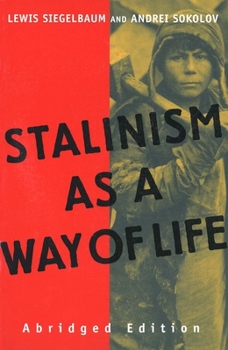Stalinism as a Way of Life: A Narrative in Documents
(Part of the Annals of Communism Series)
Select Format
Select Condition 
Book Overview
"Maybe some people are shy about writing, but I will write the real truth. . . . Is it really possible that people at the newspaper haven't heard this. . . that we don't want to be on the kolkhoz collective farm], we work and work, and there's nothing to eat. Really, how can we live?"--a farmer's letter, 1936, from Stalinism as a Way of Life What was life like for ordinary Russian citizens in the 1930s? How did they feel about socialism...
Format:Paperback
Language:English
ISBN:0300101279
ISBN13:9780300101270
Release Date:May 2004
Publisher:Yale University Press
Length:368 Pages
Weight:1.35 lbs.
Dimensions:0.9" x 6.1" x 9.1"
Customer Reviews
3 ratings
"Incredible physical and psychological overload"
Published by Thriftbooks.com User , 16 years ago
The popular picture of the Soviet Union in the 1930s as a bloody, erratic, dark prison inhabited by scurrying, cowed, silent victims of totalitarianism is only half correct. The victims were not that silent. Using their often newly acquired ability to write, they sent outspoken complaints right to the top, or nearly the top, and to newspapers. They even wrote the NKVD demanding and -- evidently -- expecting justice. Few of these complaints were published, but they weren't cast into the round file either. They were catalogued and saved and now they are being mined for an unparalleled worm's eye view of "Stalinism as a Way of Life." It was not different in principle from tsarism, even if the government was far more efficient at persecuting its citizens. But just as their grandparents had blamed misery on local officialdom and believed that if only "little father the tsar" knew what was happening, changes would be made, grandchildren believed in the goodness of centralism. Change "little father" to Stalin, or, more often, Kalinin or Krupskaia, and the grandchildren's complaints are not greatly different from what the grandparents had. Except that, as Siegelbaum and Sokolov point out (in the last words), we don't have the written thoughts of the tsarist underclasses, since tsarism was careful to keep them illiterate. More than half a century ago, Alexander Werth wrote that Russian parents, despite the persecutions, were often grateful to the Bolsheviks for at least teaching their children to read. Kneejerk anti-Bolsheviks label Werth a Red stooge for saying so, but we now know that parents do think like that. Micronesian parents felt that way about the Japanese, after centuries of indifference and oppression by the Spaniards and Germans, although otherwise it would seem they had no more reason to admire the Japanese than the Russians (and non-Russian nationalities) had to like the Communists. These selections from letters and some government reports are assembled into six categories: the beginning of collectivization, the emergence of the nomenklatura, the constitutional "debate," the false dawn before the mass roundups, the countryside and childhood. The chapter on childhood is the most poignant. Not all were complaints, some were denunciations by (probably) ambitious apparatchiks or sincere "new socialist men." As the authors say, "Social support for the regime . . . (was) located in distinct social groups . . . to whom the prodigious expansion of state power under Stalin appealed." Or who just enjoyed being overdogs after having been underdogs. You have to read the endnotes to get the full flavor. The editors barely allude to, but they do hint at the reason these letter writers expected improvements despite hunger, Kafkaesque arrests, rapes and other sufferings: People believed Bolshevik promises that the government was trying to improve things. No one ever had any reason -- not even a false hope -- to expect anything better out of tsa
Chilling dig into the archives reveals the horrors of Soviet life
Published by Thriftbooks.com User , 17 years ago
Thanks to careful digging through some of the many archives in Moscow, Siegelbaum and Sokolov have produced a minor masterpiece. They selected 157 documents (many of them letters, but some secret reports) showing the devastation wrought on the lives of Soviet citizens during the 1930s. Reading through these often heartbreaking pleas, denunciations and complaints gives you an idea of the damage done to people by Stalin's decisions to rip apart the agricultural system, focus blindly on industrialisation while purging millions of allegedly unreliable elements. As the authors say: "In reading the documents, one cannot help but be astonished at how skilfully the country's leadership created hardships and problems for its citizens, only to solve them with considerably less success." Tens of millions starved while others walked around in bare feet or attended wretched schools because all elements of society were in total chaos. What also comes through clearly is that the quickest thinkers usually did best, for they had the foresight to loudly pledge allegiance to the Communist system while the majority of the population struggled to work out what was happening. And if you take the documents here at face value, those Communist bosses were often total incompetents, more keen to curry favour with Moscow and steal what they could for family and friends rather than doing their jobs. When you finish this remarkly depressing work you do wonder quite how anything ever got done in the Soviet Union and you also marvel at how much potential the country squandered.
Heeding the past
Published by Thriftbooks.com User , 23 years ago
Siegelbaum has performed a valuable historical service by compiling these letters. Americans, and perhaps other Westerners, would do well to pay heed to what man wrought in that era, and its implications for our politically correct society of today. The outpourings of the hearts of Soviet citizens who were led to believe they were building the society of the future will, at times, make you want to cry. The responses from some of the Soviet leaders to their pleas make the blood run cold.






